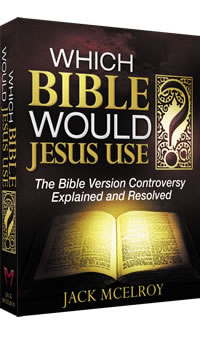Bible Versions: What Difference Does it Make?
Are there good reasons why we should be concerned about the proliferation of Bible versions, or is it "much ado about nothing?" What is the "bottom line," where "the rubber meets the road?"
Pontius Pilate asked the crucial question of the ages: "What is truth?"
Somewhere in the world there has to be something we can point to and say, "This is true, this is real, I can stake my life on it."
We say, "This is true love," or "He has true grit," or "She is true blue." All express confidence and dependability.
So when you have different versions using words with different meanings, which can you say is the "truth?" For example, is "faith" one of the fruits of the spirit in Galations 5:22 as the King James says or is it "faithfulness" (NIV)? (Compare also Eph. 5:9)
When you hold the KJV in one hand and the NIV in the other you can no longer say with complete confidence, "I hold the TRUTH in my hands." You must decide which one is really true or declare both may be wrong.
If you hold up one and say, "Thus saith the Lord" you are obliged to throw the other one in the trash for it is now "untruthful" and unreliable.
If you fail to choose one or the other, your power to witness effectively is gone. You become just another babbling voice spouting theories without authority. If you choose the wrong one, then you are guilty of teaching a lie.
Since God is not the author of confusion, the confusion in the church over Bible versions cannot be of God. For those who care to look at the proofs, the KJV is obviously God's faithful TRUTH.
First, because it is based on, and agrees with, the majority of Bible manuscripts, over 5,000 in number. The other versions are based on just a few manuscripts that appear to have been rejected by the early church because of many defects.
Second, because of the technique used in the translation. KJV translators used a method called "formal equivalence." They were primarily concerned with finding exact English wording to match the Greek or Hebrew. They carefully avoided injecting their own theology into the wording. Their goal was to put into English exactly what God said.
The other Bible versions are produced by a translation technique called "dynamic equivalence." Here the translators don't try to find exact English wording to match the original language.
Instead they try to figure out what God meant and organize the English any way they wish to convey that meaning. Right away, you can see how a translator's own theology could color the result. He will interpret the meaning in light of his own beliefs.
Though the KJV faithfully gives us what God said, the other versions are man's opinion of what God meant. This is why the KJV is the only Bible we can hold up with confidence and say, "This is what God says." The others are only what "Doctor so-and-so" thinks God said.
Researchers such as Riplinger, (New Age Bible Versions), Gipp,(An Understandable History of the Bible), Grady, (Final Authority) Burton,(Let's Weigh the Evidence ) and others have proven that dynamic equivalence produces defective translation. Variations in meaning can be traced directly back to the beliefs (or disbeliefs) of many of the translators who worked on the "modern" versions.
Satan's first strategy in the garden of Eden was to cast doubt on God's Word. Today, he poses the same question, "Yea, hath God said...?" Do you have a Bible which you can shake in his face and say, "Yea, thus saith the Lord...?"
- See more articles on related topics:
- Bible Versions
- King James Bible
- Bible Translation
- Changes in Bible Versions
Other Articles from July/August 1998:
- Church Uses Chick Tracts
to "Get the Word Out" to 7 Counties
- Be sure you know the difference:
Cult or Denomination?
- Roman 'Giant' Waking From Long Sleep in Mexico
- Baptists Included in List
of 'Dangerous Sects' in Europe
- Christian T-Shirts Work Where Tracts Restricted
- Buddha's Sacred Tooth Makes State Visit to Taiwan
More on Bible Versions:
Products of Interest:
-

Why They Changed the Bible
228 pages
See who is behind the gradual changing of modern Bibles. There’s no guessing about what these people believe. They will tell you, in their own words! -

Answers to Your Bible Version Questions
224 pages
David W. Daniels answers difficult questions about the KJV. Learn how to defend the KJV and why you can trust it. -

Sabotage?
32-PAGE, FULL COLOR COMIC BOOK - See the struggle through the ages to keep God’s Word pure, and learn which Bible can be trusted... and why!
-

Which Bible Would Jesus Use?
342 pages
Everyone's got an opinion as to which Bible is best. If Jesus walked into your church, which Bible would He quote from?



